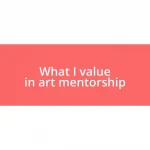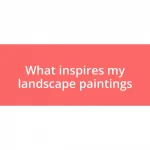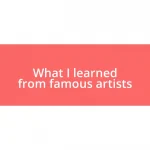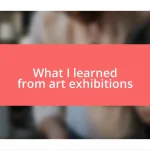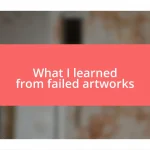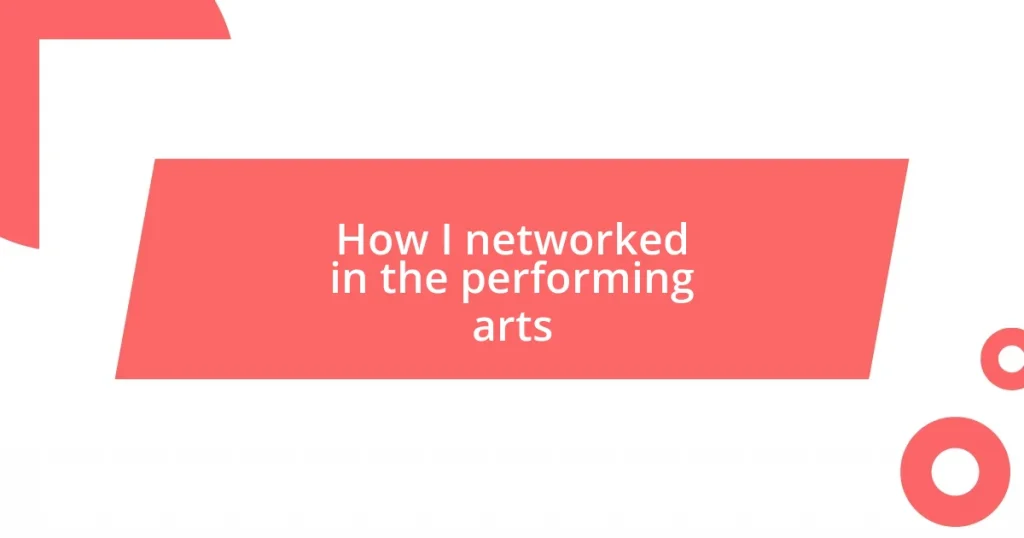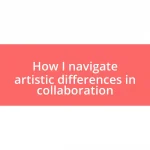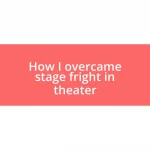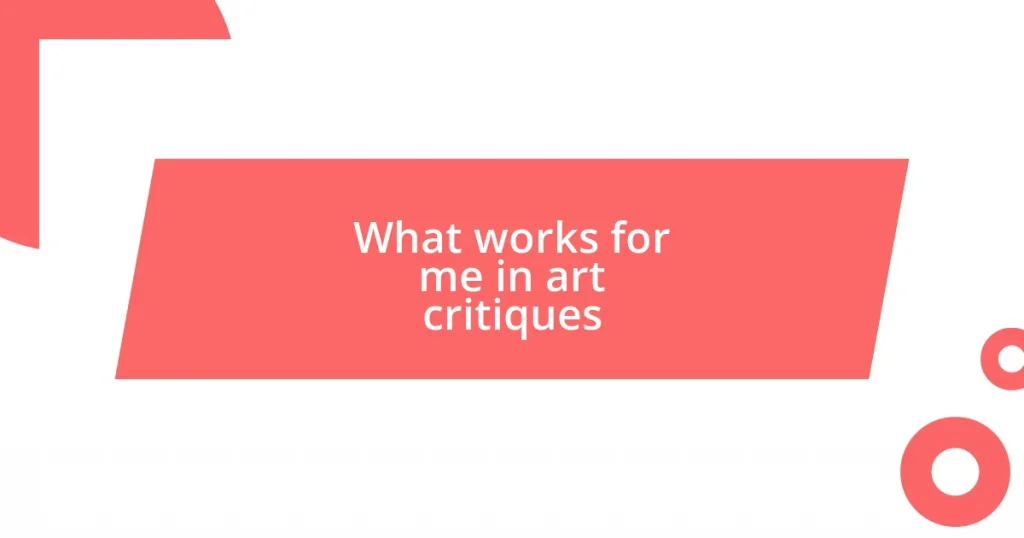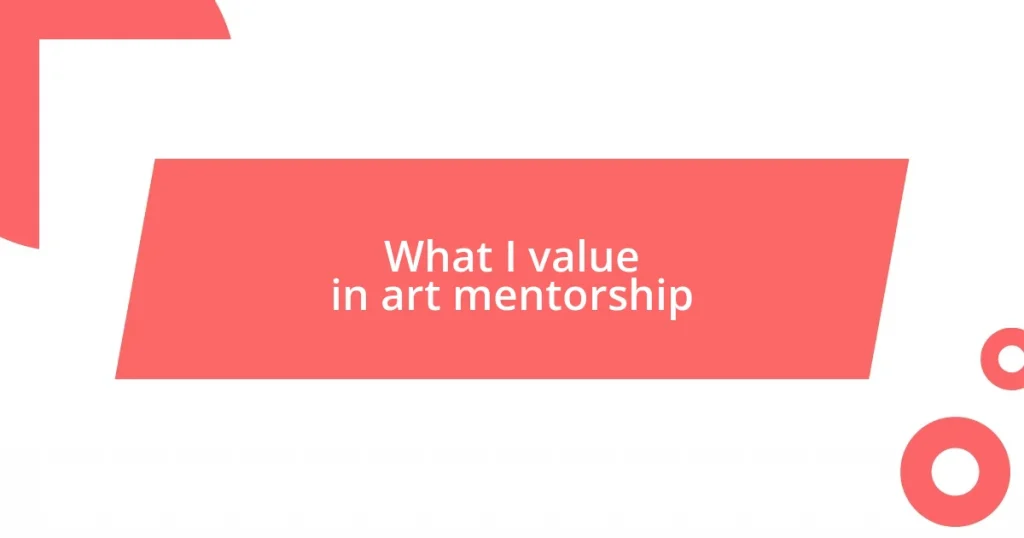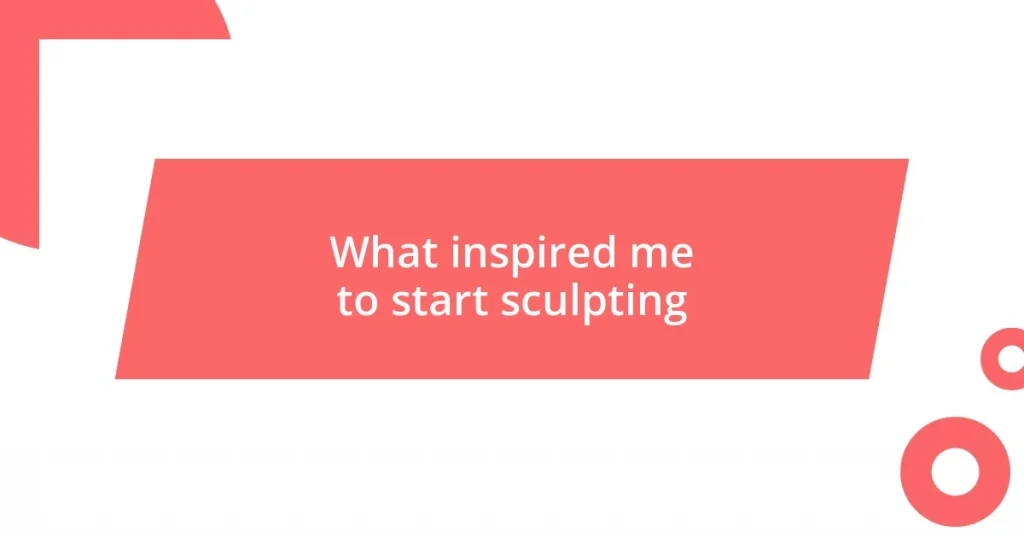Key takeaways:
- Networking in the performing arts is crucial for career advancement, focusing on building authentic relationships rather than just exchanging contacts.
- Clearly identifying networking goals can transform the experience from overwhelming to purposeful, enabling targeted connections and collaborations.
- Follow-up and maintaining connections through regular communication and shared opportunities strengthens relationships and fosters a supportive creative community.
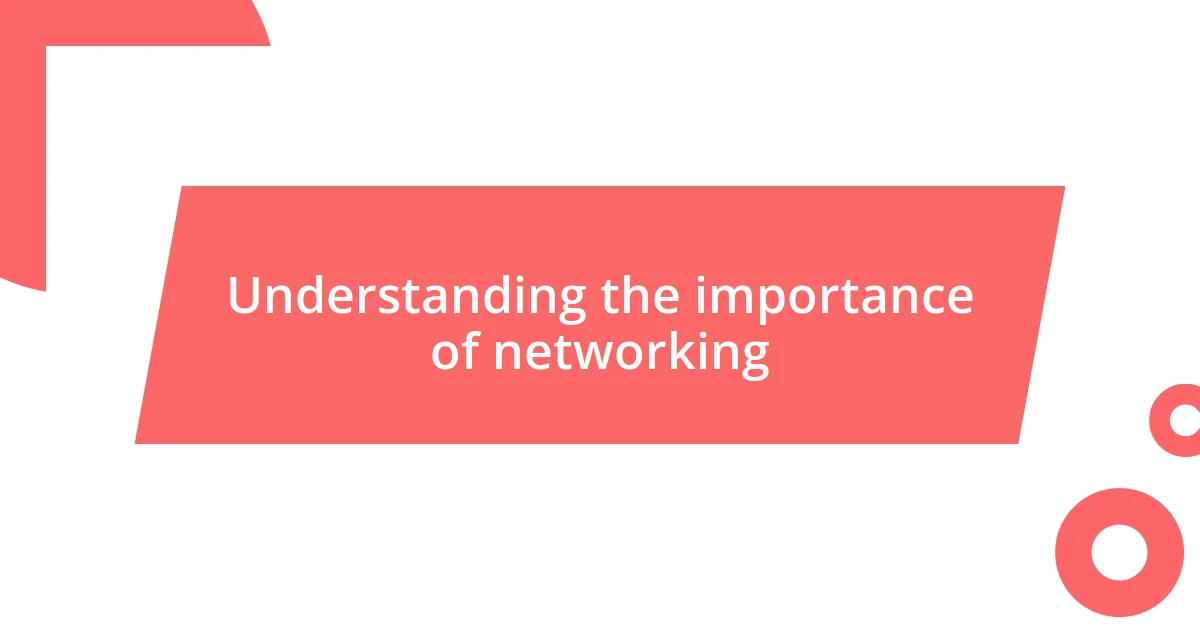
Understanding the importance of networking
Networking in the performing arts is more than just exchanging business cards; it’s about cultivating relationships that can propel your career forward. I remember attending my first open mic night, feeling incredibly nervous, and yet, the connections I made that evening launched me into opportunities I never anticipated. Had I not stepped out of my comfort zone, I wonder how many chances I would have missed.
Think about the last time you saw an inspiring performance—didn’t the buzz of the audience and the energy of the artists create something electric? That’s the power of networking. It’s about being part of a community that thrives on shared passions and mutual support, where peers can encourage each other’s growth. Personally, I’ve found that those serendipitous encounters often lead to collaborative projects that enrich my artistry and broaden my horizons.
In this industry, who you know can often open doors that your talent alone may not. When I first connected with a seasoned director at a casual gathering, I had no idea that conversation would lead to my role in a production that changed everything for me. So, I invite you to reflect: what relationships can you nurture today that might lead to your breakthrough tomorrow?
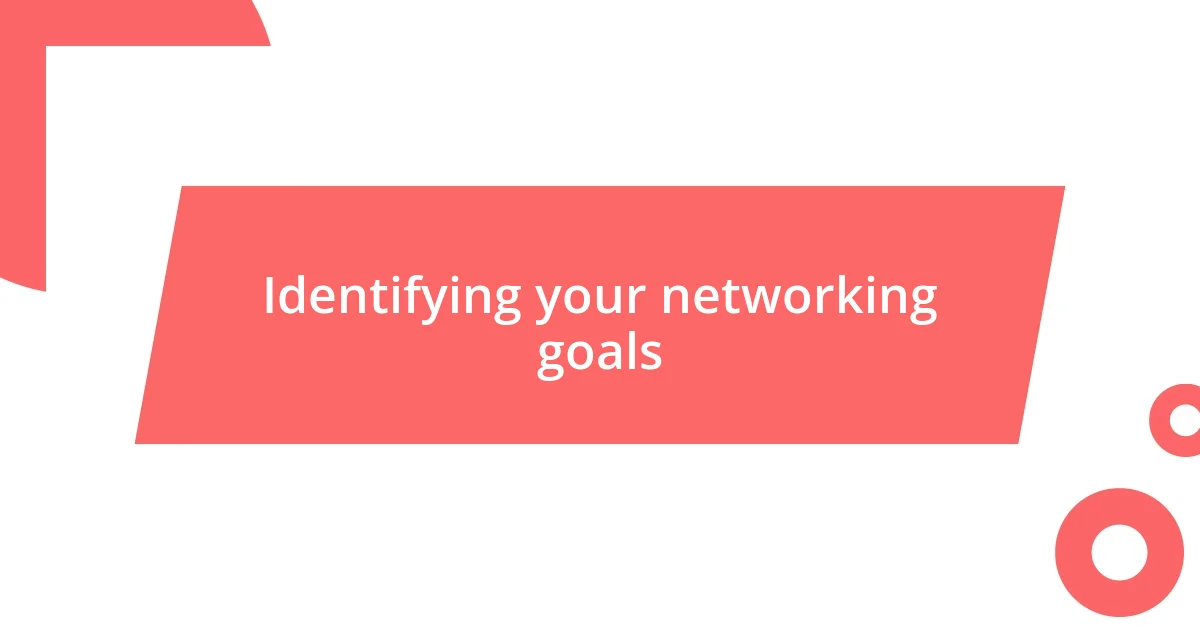
Identifying your networking goals
Identifying your networking goals is a crucial step that can shape your path in the performing arts. Reflecting on my journey, I’ve learned that without clear objectives, networking can feel aimless or even overwhelming. I remember attending an industry meetup where I had a vague notion of connecting with others, but it wasn’t until I defined my goal of seeking mentorship that I struck up a conversation with someone who later became one of my biggest advocates.
To clarify your networking goals, consider the following:
- Identify specific relationships you want to cultivate, such as mentors, collaborators, or industry professionals.
- Set clear objectives, whether it’s finding auditions, exploring creative partnerships, or gaining industry insights.
- Assess your existing connections and determine who might help you achieve your goals or introduce you to others.
- Reflect on your passions and interests to uncover what motivates you to connect with others in this vibrant community.
By pinpointing what you hope to achieve, you transform networking from a daunting task into an exciting opportunity to grow and learn.
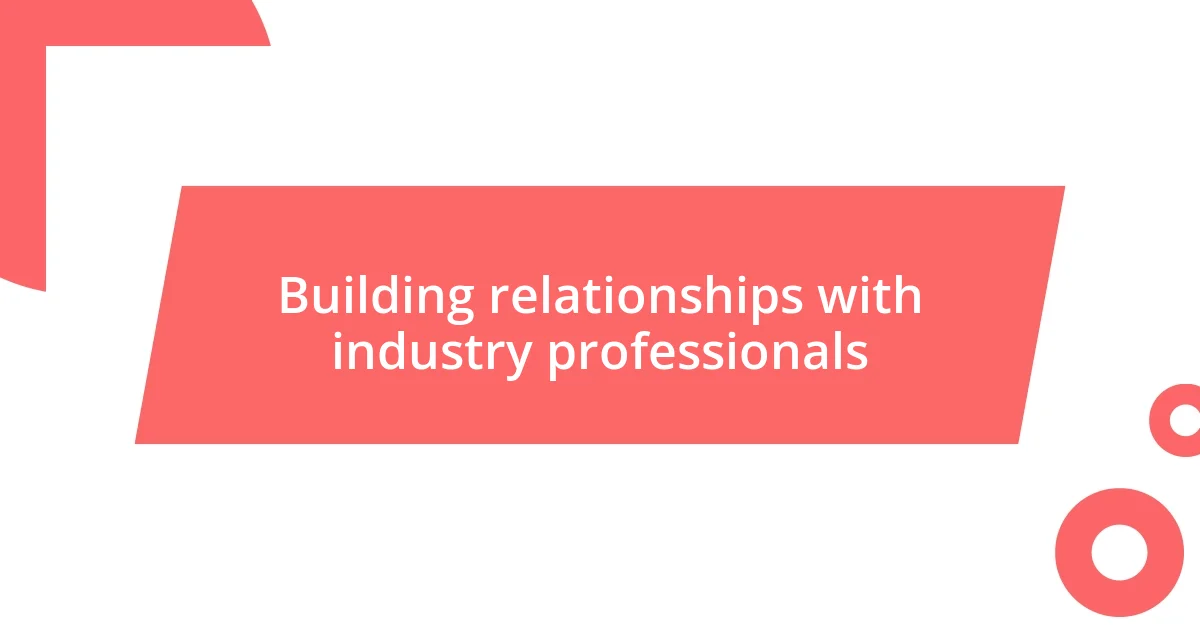
Building relationships with industry professionals
Building relationships in the performing arts is essential for long-term success and growth. From my experience, it goes beyond mere introductions—it’s about forging authentic connections. I recall a moment when I bumped into a fellow actor in a coffee shop. We struck up a conversation that led to regular meet-ups, and eventually, we co-created a project that reflected both our artistic visions. This reminded me that relationships can flourish from the most unexpected interactions.
Fostering these connections takes intention. I’ve learned to actively engage with industry professionals by attending workshops, festivals, and local performances. Each event presents a chance to meet someone new and share stories. One time, while volunteering at a theater, I met a playwright who invited me to participate in a reading of her new work. That invitation transformed not just my understanding of her creative process but also opened doors to collaborations with other talented artists in her network—a net gain for everyone involved.
Investing time in relationship-building can feel daunting but remember, every conversation counts. I frequently follow up with new contacts, sending a quick message or sharing a resource that might interest them. This simple gesture reinforces mutual support and nurtures lasting bonds. I often find myself reflecting on these interactions, realizing how much they contribute to my ongoing journey in the performing arts.
| Relationship Building | Important Actions |
|---|---|
| Authenticity | Engage genuinely in conversations, share personal stories |
| Consistency | Follow up regularly with your contacts, stay in touch |
| Initiative | Proactively reach out to industry professionals and seek collaborations |
| Reciprocity | Offer support and resources to others in your network |
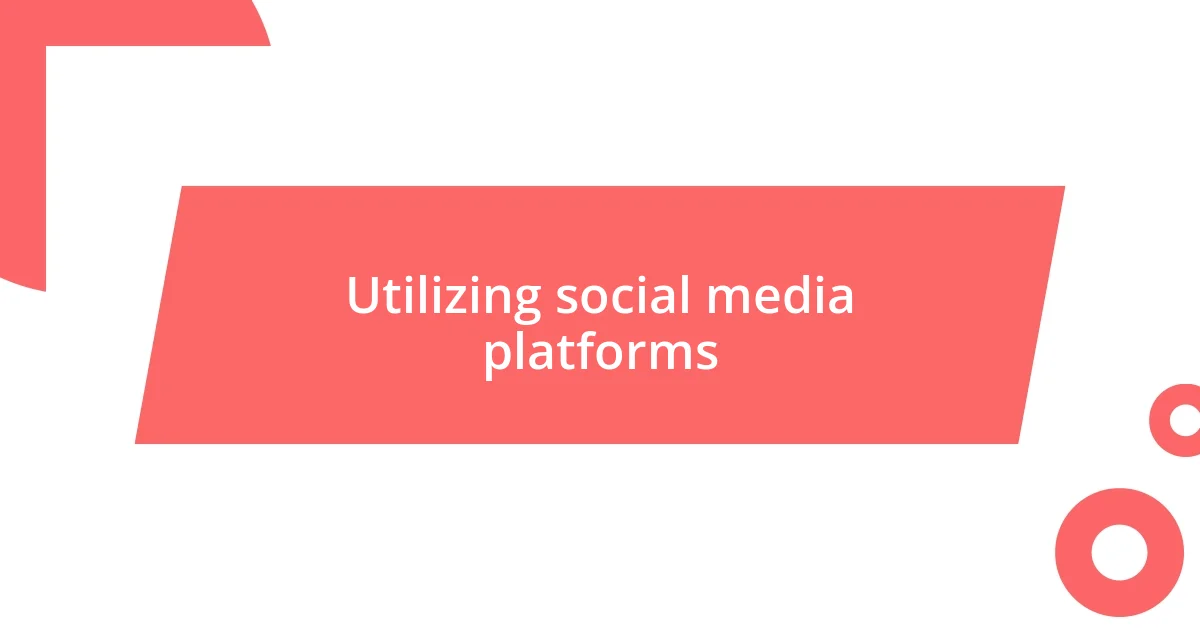
Utilizing social media platforms
Utilizing social media platforms can be a game-changer in the performing arts. I remember the first time I shared my latest project on Instagram. The likes and comments from both friends and industry peers were incredible. It opened up conversations I hadn’t expected. By sharing my journey in real-time, I fostered a sense of community and connection that I struggled to build in person at first.
From my experience, platforms like Twitter and LinkedIn offer unique opportunities for engagement. Last year, I tweeted about an audition experience and tagged a local theater. To my surprise, their artistic director reached out to me directly! This interaction made me realize the power of being transparent and authentic online—people want to connect with real stories. Have you tried engaging with industry leaders on social media? It’s an easy way to make your presence known.
One of my favorite aspects of social media is how it facilitates collaboration. I once joined a Facebook group dedicated to independent filmmakers, and through a simple post seeking advice, I ended up collaborating on a short film with a fellow group member. It’s moments like these that remind me the performing arts community is vast, but social media can bridge those gaps beautifully, enabling us to discover and nurture meaningful connections, often in the most unexpected ways.
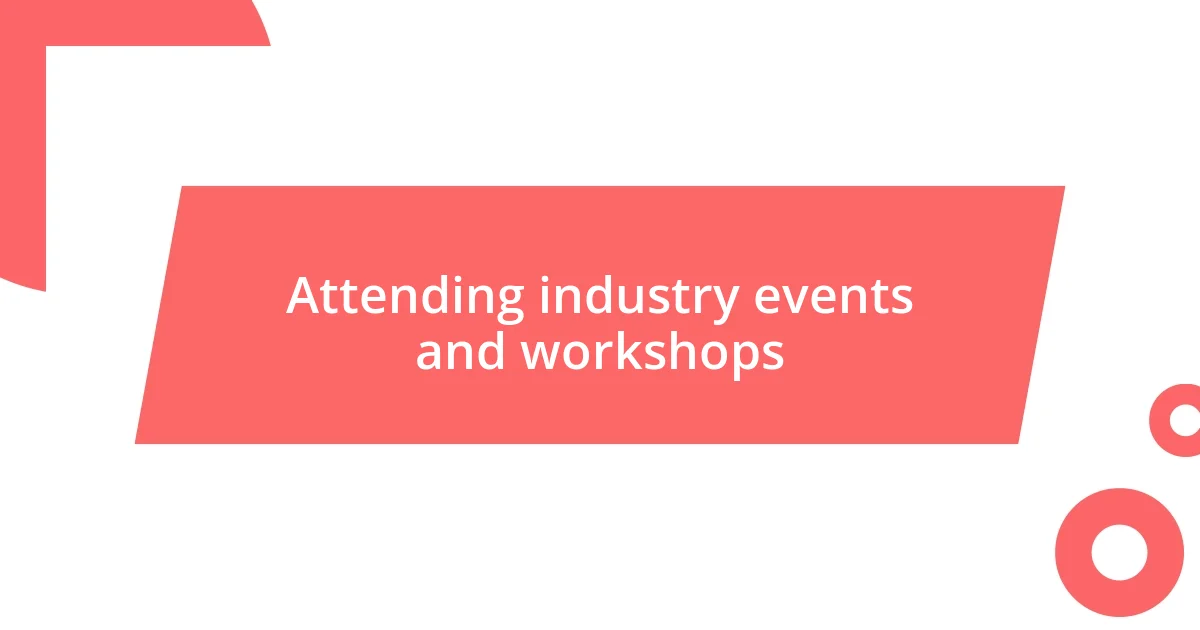
Attending industry events and workshops
Attending industry events and workshops has been a game-changer for my networking journey in the performing arts. I’ll never forget my first theater festival—walking into the venue, I was filled with a mix of excitement and nervousness. I made it a point to strike up conversations with fellow attendees during breaks. One chat led me to connect with a director who was looking for fresh talent for her upcoming production. Can you imagine how quickly the right conversation can propel your career forward?
Workshops, in particular, are invaluable for skill-building and making connections. I once participated in a masterclass with a renowned choreographer. Not only did I learn techniques that truly challenged me, but I also bonded with other participants—many of whom are now close friends and collaborators. Workshops create a unique environment where people share their vulnerabilities and aspirations. The energy during those sessions can spark collaborations that might not happen in more formal settings. Have you ever experienced that kind of transformative connection in a workshop?
Finally, following up after these events is crucial. I remember attending a panel discussion and exchanging contacts with a panelist who genuinely resonated with my artistic ambitions. After the event, I sent them a thank-you note, sharing my thoughts on their insights. Much to my surprise, they responded positively, and we ended up meeting for coffee. That small effort transformed a fleeting interaction into a mentorship that has shaped my path ever since. I encourage you to take that leap after an event; you never know where that follow-up might lead.
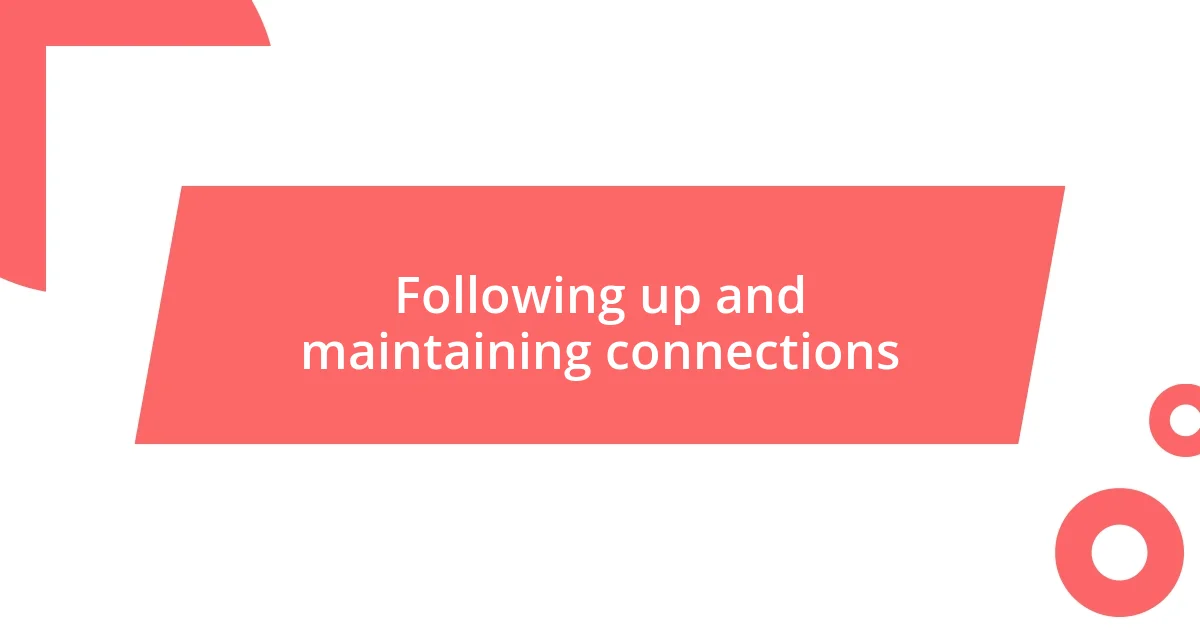
Following up and maintaining connections
Maintaining connections after making initial contact is essential in the performing arts. After I met a talented playwright at a local showcase, I made sure to send them a message not long after our encounter. I expressed how much I enjoyed their performance and mentioned a specific moment that resonated with me. This personal touch opened the door for ongoing conversation and collaboration, making me feel like I was part of a supportive creative community. Have you ever reached out to someone long after meeting? It can breathe new life into connections.
I also find that sharing relevant opportunities can keep friendships and professional ties strong. A few months ago, I came across a grant that I immediately thought of for a colleague who was working on a project that aligned perfectly with the application. Reaching out to let them know about it not only helped them but also reinforced our connection—it showed that I care about their success. How often do we think of promoting others? It’s a simple way to build trust and goodwill in your network.
Then there’s the art of regular check-ins. I’ve made a habit of sending a quick note or sharing an article that I believe would interest my contacts every couple of months. Recently, I sent a fellow performer an invite to a play I was co-producing. It reminded them of our shared history and reignited our connection. It’s amazing how a small gesture can remind someone that you value their presence in your network. What simple acts do you incorporate into your networking strategy?
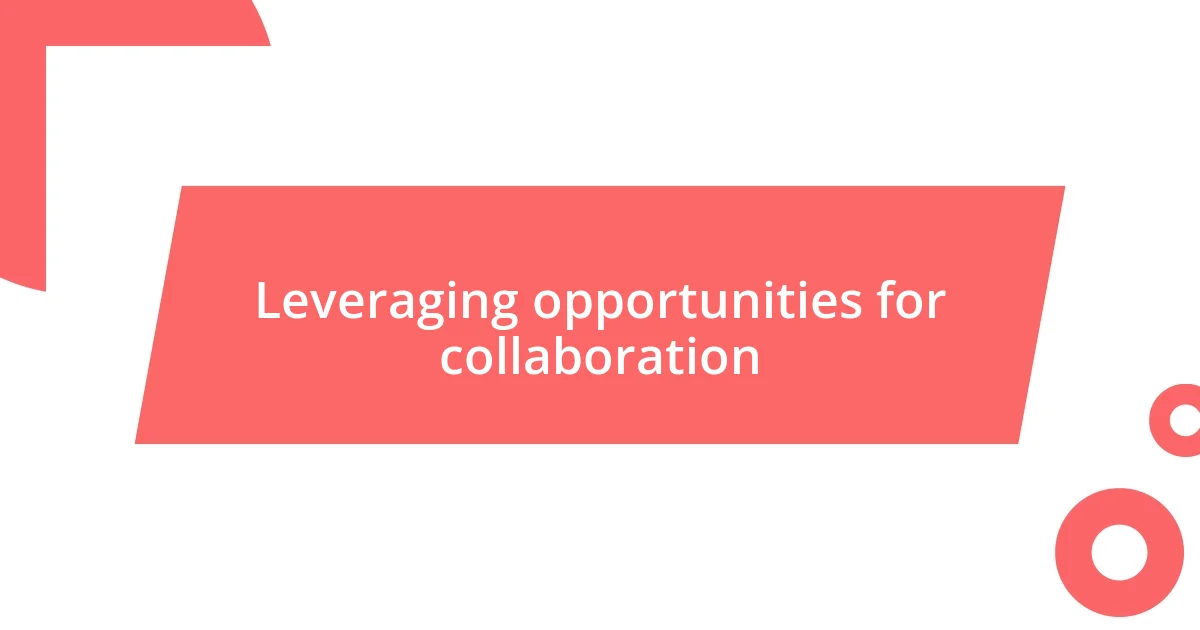
Leveraging opportunities for collaboration
When it comes to leveraging opportunities for collaboration, I’ve found that being open to different perspectives can lead to unexpected partnerships. Last summer, I collaborated with a musician I met at a community event. We initially bonded over our love for storytelling in our respective crafts. This connection ignited an exciting project that combined theater and live music, elevating both of our artistic expressions. Have you ever ventured outside of your usual circle to discover how collaborative magic can unfold?
Being proactive about seeking collaboration is key. I remember attending a play reading where I overheard a director discussing a need for scenic design on a new project. Without hesitating, I introduced myself and shared my portfolio. By expressing genuine interest in their vision, I not only secured the opportunity to work on the project but also built a long-term relationship with the director. How often do we seize those fleeting moments to grab hold of potential collaborations?
Additionally, nurturing these professional bonds is vital. I strive to have regular brainstorming sessions with my collaborators, where we can bounce ideas off each other without judgment. Recently, I hosted a casual dinner for a few artists I admire. The atmosphere was relaxed, and the conversation flowed freely. By the end of the night, we had mapped out plans for a collaborative project that none of us had even envisioned before the gathering. Isn’t it fascinating how sharing a meal can transform professional connections into meaningful collaborations?

